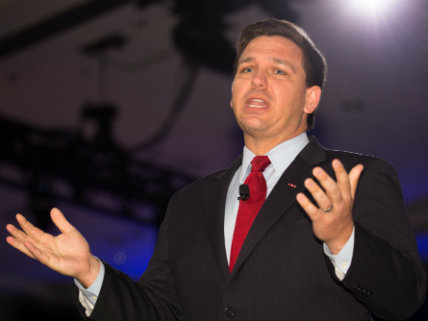We Can't Find Out How Much Retired Federal Workers Get Paid, and That's a Problem
What's retired IRS chief Lois Lerner's pension? No one, besides Lerner, knows. Adam Andrzejewski and Rep. Ron DeSantis want to find out.

Most news coverage about pension issues revolves around the states.
Partially, that's for good reason. States are dealing with a collective shortfall of more than $1.75 trillion (and probably more, because of how those liabilities are calculated), and some states truly are screwed by the over-generous, under-funded retirement promises they've made to public workers for the past few decades.
Partially, though, the state focus is because we just don't know much about the federal government's pension situation.
Sure, it's known that the various federal employee pensions systems covering civilian and military employee benefits have an unfunded liability—that's the gap between what a pension system owes to beneficiaries and what assets it has available to pay them—of about $3.5 trillion (equal to about 20 percent of America's annual GDP), according to Moody's.
We also know that the feds pay roughly $75 billion to civilian retirees and their survivors, and roughly $50 billion to military retirees and their survivors, each year. For comparison, there's only two states (New York and California) with annual budgets larger than that.
And we also know that all the complicated math beyond those pension payouts, the long-term costs, and unfunded liabilities, is calculated inside a hollowed-out mountain in western Pennsylvania, in a bunker designed to survive a nuclear apocalypse. No, really, that's true.
Still, when it comes down to who-gets-what, we don't know much of anything at all. Federal courts have long held that pension payouts to retired federal workers are secret, reasoning that disclosing that information would be a violation of pensioners' privacy.
By contrast, most states make that information public. Doing so gives taxpayers (who are funding a not insignificant portion of the pension bill) some transparency about how their dollars are being used, but it also lets watchdog groups look for potential pension abusers.
Adam Andrzejewski, founder and CEO of Open The Books, one of those watchdog groups that tracks pension spending at the state level, says that needs to change, because you can't reform what you can't see.
"If active salaries (by name) are disclosed, why would posting federal retiree pension amounts, service credits and contributions be an invasion of privacy? The same privacy law underlies both records," Andrzejewski wrote Tuesday in an op-ed at Forbes.
Open The Books is calling for Congress to change the rules that keep federal pension payouts secret. Andrzejewski told Reason that his organization is working with Rep. Ron DeSantis (R-Florida) to introduce legislation to give taxpayers more information about federal pension payouts. Elizabeth Dillon, DeSantis' communications director, declined to comment Tuesday on the details of the bill, which is not yet introduced, but she confirmed to Reason that it would increase transparency in federal pensions.
Earlier this year, DeSantis reintroduced his End Pensions In Congress Act, which would end pensions for all future Members of Congress as well as those currently serving who are not yet vested into the congressional retirement plan. DeSantis does not accept a federal pension, Dillon said.
Those transparency laws don't necessarily fix America's pension problems, but they help improve the debate—or at least catch individual fraudsters. Transparency at the state level helped Open The Books expose fraudulent pension payouts in Illinois, California, and at the Port Authority of New York and New Jersey. Those same laws making pension information publicly available is why we know about retired municipal officials getting pensions seven times larger than the median household income in the town where they live, and how we know that the most lucrative pension in California during 2015 belonged to Michael Johnson, the former Solano County administrator who got a $388,407 pension that year.
When it comes to federal retirees, though, it's all a guessing game.
How big of a pension is Lois Lerner, the former Internal Revenue Service chief, getting? Andrzejewski points out that estimates by two Washington think tanks vary by as much as $52,000 and no one knows for sure—except Lerner.
"The American people deserve to see the granular details of who's receiving what, when and after how long," he wrote Tuesday at Forbes. "It's the only fair way to debate taxpayer-guaranteed job benefits."


Show Comments (57)